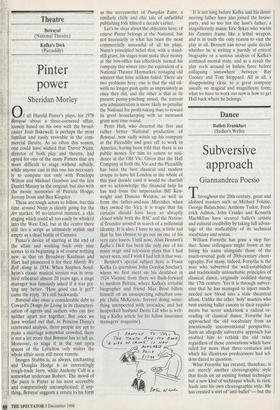Theatre
Betrayal (National Theatre) Kafka's Dick (Piccadilly)
Pinter power
Sheridan Morley
f all Harold Pinter's plays, his 1978 Betrayal about a three-cornered affair, loosely based on his own with the broad- caster Joan Bakewell, is perhaps the most familiar and easily revivable in the com- mercial theatre. As so often this season, one could have wished that Trevor Nunn, director of both play and theatre, had opted for one of the many Pinters that are more difficult to stage without subsidy, while anyone cast in this one has necessari- ly to compete not only with Penelope Wilton and Michael Gambon and the late Daniel Massey in the original, but also with the movie memories of Patricia Hodge, Jeremy Irons and Ben Kingsley.
These are tough actors to follow, but this time around Nunn is clearly going for the Art market; 90 no-interval minutes, a chic staging which could all too easily be whisked into the West End, but at the centre there still lies a script as ultimately stylish and empty as a dead bottle of Cinzano.
Pinter's device of starting at the end of the affair and working back over nine scenes to its beginning is of course nothing new, in that on Broadway Kaufman and Hart had pioneered it for their Merrily We Roll Along in 1934. When Stephen Sond- heim's classic musical version was in trou- bled rehearsal almost 20 years ago, a stage manager was famously asked if it was get- ting any better. 'How good can it get?' came the reply. 'It's still backwards.'
Betrayal also owes a considerable debt to Coward's Design for Living in its characteri- sation of agents and authors who can live neither apart nor together. But once we have worked out that, in Princess Diana's celebrated analysis, three people are apt to make a marriage somewhat crowded, there is not a lot more that Betrayal has to tell us. Moreover, to stage it in the vast open spaces of the Lyttelton only makes the whole affair seem still more remote.
Imogen Stubbs is, as always, enchanting and Douglas Hodge is an interestingly rough-trade Jerry, while Anthony Calf is a somewhat undercast Robert. The mood of the piece is Pinter at his most accessible and comparatively uncomplicated; if any- thing, Betrayal suggests a return to his form as the screenwriter of Pumpkin Eater, a similarly chilly and chic tale of unfaithful publishing folk filmed a decade earlier. Let's be clear about the objection here; of course Pinter belongs at the National, but not necessarily in what has been the most commercially successful of all his plays. Nunn's principled belief that, with a stand- still grant, his stages must make their money at the box-office has effectively turned his company this winter into the equivalent of a National Theatre Haymarket, restaging old winners that have seldom failed. There are two problems here; one is that the old oil- wells no longer gush quite as impressively as once they did, and the other is that in its present penny-pinching mood, the current arts administration is more likely to penalise the National for profit-taking than to reward its good housekeeping with an increased grant next time round.
Peter Hall, who directed the first and rather better National production of Betrayal, now sadly winds up his company at the Piccadilly and goes off to work in America, having been told that there is no public money for him to return to resi- dence at the Old Vic. Given that the Hall Company at both the Vic and the Piccadilly has been the best classical and modern troupe to have hit London in the whole of this past decade (and it would be churlish not to acknowledge the financial help he has had from the impresarios Bill Ken- wright and Duncan Weldon, as well as from the father-and-son Mirvishes when they owned the Vic), it is tragic that his curtains should have been so abruptly closed while both the RSC and the Nation- al flounder around in search of a millennial identity. It is also, I have to say, a little sad that he has chosen to go out on one of his very rare losers. Until now, Alan Bennett's Kafka's Dick has been the only one of his many stage and television plays that I had never seen, and I wish I had left it that way.
Bennett's special subject here is Franz Kafka (a querulous John Gordon Sinclair), whom we first meet on his deathbed in 1924 Vienna; from there we flash-forward to modern Britain, where Kafka's irritable biographer and friend Max Brod billets himself on an unsuspecting suburban cou- ple (Julia McKenzie, forever doing some- thing unexpected with avocados, and her henpecked husband Denis Lill who is writ- ing a Kafka article for his fellow insurance managers' magazine). It is not long before Kafka and his domi- neering father have also joined the house- party, and so too has the host's father, a magnificently manic Eric Sykes who wields his Zimmer frame like a lethal weapon, and is in truth the only reason to visit the play at all. Bennett can never quite decide whether he is writing a parody of critical biography or a serious analysis of Kafka's confused mental state, and as a result the play reels around in listless farce before collapsing somewhere between Ray Cooney and Tom Stoppard. All in all, a disappointing close to a great company usually on magical and magnificent form; what we have to work out now is how to get Hall back where he belongs.


















































































 Previous page
Previous page